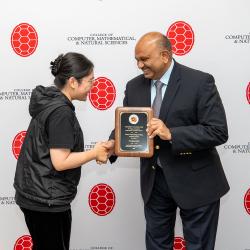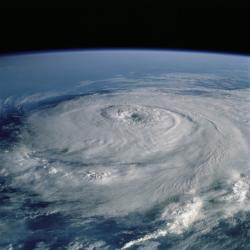Chesapeake Scholars Program Helps Biochemistry Major Build Connections Beyond the Classroom
Thanks to the scholarship’s support, Jamil Yacoubou Adam found his community at UMD.
When University of Maryland sophomore biochemistry major Jamil “Jam” Yacoubou Adam first received an email about the Chesapeake Scholars Program in the summer of 2023, he hesitated. He had just graduated high school and wasn’t certain that he was ready to take on a full courseload as well as an additional program during his first year at UMD.

Not ready to give up on an opportunity, he reached out to the UMD Office of Student Financial Aid and after a quick meeting, he decided the program would be worth the extra leg work.
“The idea behind Chesapeake Scholars of fostering a new community of STEM scholars sounded amazing to me,” Yacoubou Adam said. “I was a little ambivalent about my major and how I’d be able to navigate it. But I realized that the program would be a place to meet other STEM majors and connect with them outside of class. And I’d also be able to access professors and mentors in the program, resources I wouldn’t have been able to get to otherwise.”
Funded by the U.S. National Science Foundation’s Scholarships in Science, Technology, Engineering and Mathematics (S-STEM) program, UMD’s Chesapeake Scholars in Physical Sciences program was created to support talented undergraduates facing financial challenges during their academic journey. At the helm of the program are nine UMD faculty and staff members: Physics’ Eun-Suk Seo, Thomas Gleason, Carter Hall, Donna Hammer and Chandra Turpen; Astronomy’s Melissa Hayes-Gehrke; Atmospheric and Oceanic Sciences’ Alexandra Jones; Chemistry and Biochemistry’s Jason Kahn; and Geology’s John Merck. Led by Seo, the team designed a plan to provide personalized financial, academic and professional support to newly admitted physical sciences students throughout their journeys at UMD.
“The scholarship allows them to concentrate full-time on their studies while limiting the need to work to fund their education,” said Kahn, who became Yacoubou Adam’s mentor in the program. “We’re really trying to open doors for these students by giving them an augmented learning experience through one-on-one academic advising, professional development and networking sessions, research opportunities and tutoring.”
Overcoming hurdles and breaking the ice
During his first semester, Yacoubou Adam had two major goals as an undergrad: to succeed academically and to keep up his training as an amateur high hurdler, an important extracurricular hobby he picked up in high school. He already knew how to hone his skills on the track, but he found himself unsure of how to do the same as a biochemistry major. What would be the best classes to take to pursue his dream of becoming a genetic disease researcher? Where could he meet peers with similar goals? What kind of skills would he need to be considered for internships or research groups in the field? Where could he find those opportunities? Anticipating these sorts of questions from students like Yacoubou Adam, the Chesapeake Scholars program provided the answers.
“Many students have never seen the things they learn in classrooms in action in the real world, so we wanted to show them the kind of possibilities they’ll have with a STEM degree,” Kahn said. “We planned field trips to NASA’s Goddard Space Flight Center, the National Institute of Standards and Technology, and the National Oceanic and Atmospheric Administration so that they could see the environment and how research there is conducted.”

One of Adam’s favorite memories is a trip to Chicago last fall to attend the American Association for the Advancement of Sciences’ 2024 S-STEM Scholars & PI Meeting. There, he attended workshops, talks and networking sessions with other STEM students and faculty from around the country. He also got to know his classmates and advisor outside of an academic environment.
“Sitting down for a deep-dish pizza with Dr. Kahn and two other Chesapeake Scholars, Akila [Manage] and Diego [Moreno], was amazing,” Yacoubou Adam said. “It was the first real casual interaction I had with everyone after breaking the ice last year and getting to know them better over a hearty meal after sightseeing in the Chicago cold will always be a core college memory for me.”
For Yacoubou Adam, that trip and group dinner made a profound difference in his journey as an aspiring scientist. It was the first time he could see where he could apply his biochemistry skills in the future and what he could do as a researcher with his unique experiences.
“One of the biggest challenges I’ve overcome as a result of this program has been making STEM friends. It was difficult for me, as someone who looks and sometimes acts like a stereotypical athlete, to feel like I belonged in the lab or at a conference,” Yacoubou Adam reflected. “This program has let me build bridges with people I probably never would have met or gotten to know because I just assumed the only things we had in common are our classes. It’s made me more confident in what I can do in the future after graduation.”
Looking to the future
With the Chesapeake Scholars program scheduled to continue until 2027, its UMD faculty organizers hope it can continue to positively impact students like Yacoubou Adam. Beyond financial assistance and academic support, the Chesapeake Scholars Program creates a close-knit academic community where STEM students from different backgrounds forge meaningful connections, develop important skills and grow into well-rounded researchers prepared for the science of tomorrow.
For Yacoubou Adam, the Chesapeake Scholars program made a lasting difference in his undergrad experience by supporting his research aspirations and connecting him with like-minded peers. Now two years into the program and his biochemistry major, he hopes to continue building up his resume with internships and research opportunities and making new connections at program events.
“STEM majors are an odd bunch and can be hard to get to know,” he joked. “But having a program where we can all just come and study together, talk casually with each other and share experiences makes breaking the ice so much easier.”







